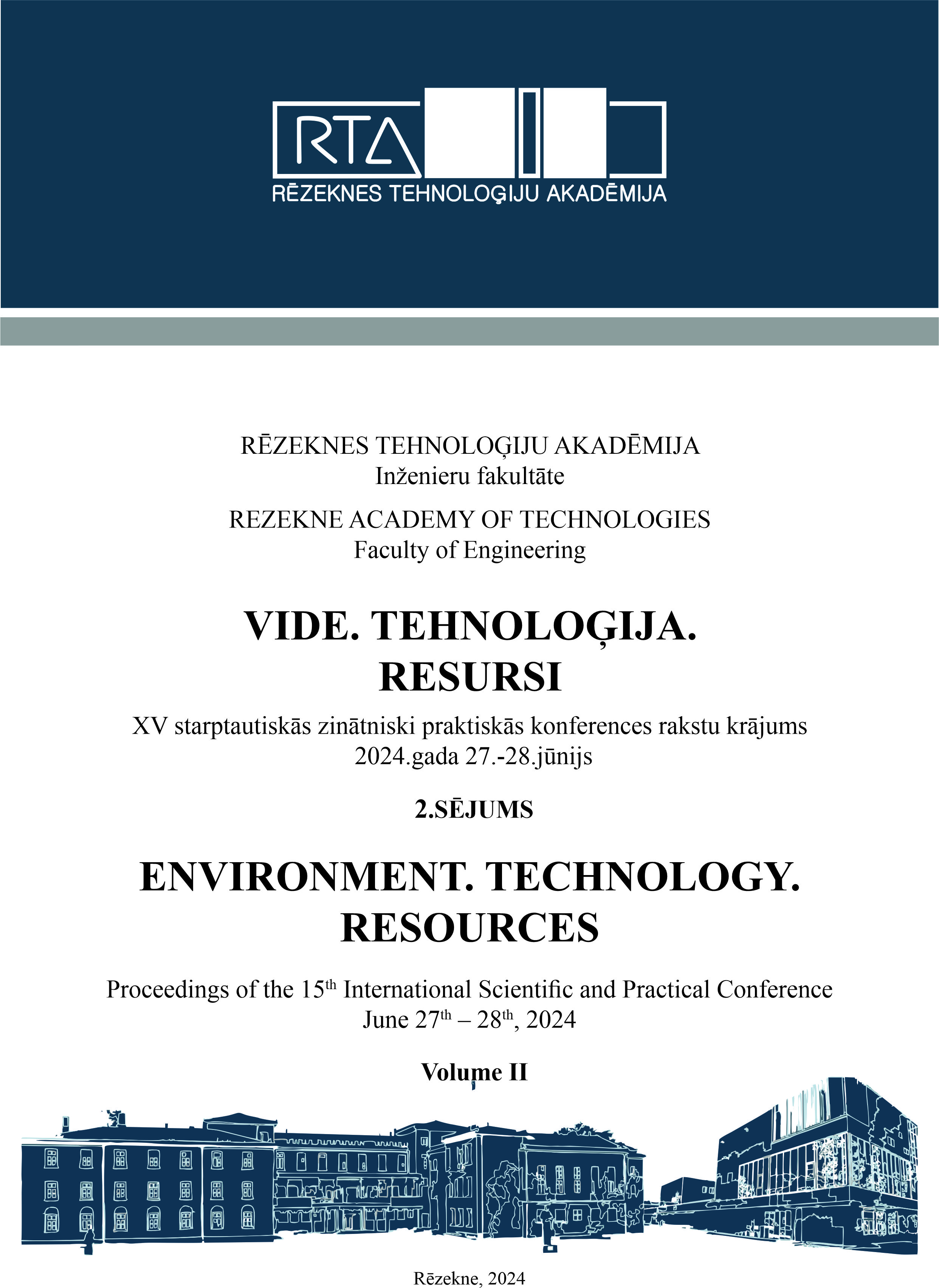ESG COMPETENCES AND SKILLS IN LIFELONG EDUCATION FOR SUSTAINABILITY
DOI:
https://doi.org/10.17770/etr2024vol2.8091Keywords:
ESG-education, Sustainability, Competences, Lifelong LearningAbstract
Sustainability paradigm being a global trend nowadays embraces not only a shift in problematics numerous areas of knowledge, but primarily a leap in mindset, which involves a revision of values and priorities for humanity at all. Thus, education for sustainable development and acquiring ESG (Environmental, Social, Governance) competences start to be a relevant drift in learning space. This area becoming a targeting for international regulation and an extensive part of educational services in response to labour market demands. This paper is focused on analysis of current state and prospectives of ESG education in EU. Based on the assessment of existing frameworks and stakeholders’ needs an ESG-competences map was proposed. In this research a qualitative approach was applied. Thus, mostly secondary sources of information were used, particularly similar-topic scholars’ studies, databases, ESG and education regulatory documents and analytics, open access information from internet resources. Logical and comparative analysis was used for data processing. It was assessed educational models applying, content and institutional forms of existing ESG-programs, in higher education, specialists’ upskilling, and livelong education as well. There were considered main programs offered in education for sustainability and top ESG-skills required as far. Existing problems in education for sustainability were identified and a set of recommendations to develop lifelong acquiring ESG-knowledge system was provided.
Downloads
References
UNESCO “Strategy Education for Sustainable Development 2021-2030”, 2020. [Online]. Available: https://www.env.go.jp/policy/entaku06_ref03_1.pdf [Accessed: Feb. 12, 2024].
M. Barth, J. Godemann, M. Rieckmann, U. Stoltenberg, “Developing key competencies for sustainable development in higher education”. Int J Sustain High Educ Vol. 8(4), pp. 416–430, 2007.
M. Rieckmann, “Future oriented higher education: which key competencies should be fostered through university teaching and learning?”. Futures Vol. 44(2), pp.127–135, 2012.
K. B. Barth, M. C. Gisela, M.Cohen, L.Diaz, S. Doucette-Remington, D. Weston, H. Geoffrey, and others, “Key competencies in sustainability in higher education—toward an agreed-upon reference framework”. Sustainability Science, Vol. 16(1), pp. 13-29, 2021.
S. Wilhelm, R. Förster, A. Zimmermann, “Implementing competence orientation: towards constructively aligned education for sustainable development in university‑level teaching‑and‑learning”. Sustainability, Vol. 11(7), pp. 1891, 2019.
S.Montanari, , E. Agostini, D. Francesconi, “Are We Talking about Green Skills or Sustainability Competences? A Scoping Review Using Scientometric Analysis of Two Apparently Similar Topics in the Field of Sustainability”. Sustainability, Vol. 15(19), pp. 14142, 2023.
European Commission “Council Recommendation on learning for the green transition and sustainable development (2022/C 243/01)”, European Education Area. Quality education and training for all,[Online]. Available: https://eur-lex.europa.eu/legal-content/EN/TXT/PDF/?uri=CELEX:32022H0627(01) [Accessed: Feb. 12, 2024].
UNECE “Framework for the implementation of the United Nations Economic Commission for Europe Strategy for Education for Sustainable Development from 2021 to 2030” [Online]. Available: https://unece.org/environment/documents/2022/05/working-documents/framework-implementation-united-nations-economic [Accessed: Feb. 20, 2024]
European Commission “Council Resolution on a strategic framework for European cooperation in education and training towards the European Education Area and beyond (2021-2030)” 2021/C 66/01 [Online]. Available: https://op.europa.eu/en/publication-detail/-/publication/b004d247-77d4-11eb-9ac9-01aa75ed71a1 [Accessed: Feb. 20, 2024]
European Commission “European Skills Agenda for sustainable competitiveness, social fairness and resilience”, 2020 [Online]. Available: https://migrant-integration.ec.europa.eu/library-document/european-skills-agenda-sustainable-competitiveness-social-fairness-and-resilience_en [Accessed: Feb. 20, 2024]
European Commission “GreenComp The European sustainability competence framework, 2022 [Online]. Available: https://green-comp.eu/wp-content/uploads/2022/02/jrc128040_greencomp_f2.pdf [Accessed: Feb. 20, 2024]
European Commission “European Comission “Key Competences For Lifelong Learning”, 2019 [Online]. Available: https://op.europa.eu/en/publication-detail/-/publication/297a33c8-a1f3-11e9-9d01-01aa75ed71a1/language-en [Accessed: Feb. 20, 2024]
European Commission “A New ERA for Research and Innovation. Staff Working Document”, 2020 [Online]. Available: https://op.europa.eu/en/publication-detail/-/publication/f8f19fc4-2888-11eb-9d7e-01aa75ed71a1/ [Accessed: Feb. 20, 2024]
A Global Business Coalition for Education Report “Unlocking Potential and Performance: Recognizing Education’s Position at the Core of ESG”, 2022 [Online]. Available: https://gbc-education.org/resources/environmental-social-governance/ [Accessed: Feb. 20, 2024]
P.M. Acosta Castellanos, A. Queiruga-Dios, “From environmental education to education for sustainable development in higher education: a systematic review”. International Journal of Sustainability in Higher Education, vol. 23(3), pp. 622-644, 2022.
M. Dzurenda, “Leadership Development in Education for Sustainable Development: Evaluation of Higher Education Students in Sustainable Development Programs,” Dr. Ph. thesis, Coastal Carolina University, US, 2022.
Financial Times “In charts: Business school teaching on ESG” 2021 [Online]. Available: https://www.ft.com/content/1177bd03-22a4-42e1-9d83-bec979755c4d [Accessed: Feb. 20, 2024].
OECD Future of Education and Skills 2030, 2018 [Online]. Available: https://www.oecd.org/education/2030/E2030%20Position%20Paper%20(05.04.2018).pdf [Accessed: Feb. 20, 2024].
W.Lambrechts, P.Van Petegem, “The interrelations between competences forsustainable development and research competences”, International Journal of Sustainability in Higher Education, Vol. 17 (6), pp. 776-79. 2016.
O. Laasch, D.C. Moosmayer, E.P.Antonacopoulou, “The Interdisciplinary Responsible Management Competence Framework: An Integrative Review of Ethics, Responsibility, and Sustainability Competences”. Journal of Business Ethics, Vol. 187(4), pp. 733-757, 2023.
A. Alberton, A. P. Kieling, F. R. Lyra, E. M. Hofmann, M. P. V. Lopez, S. R. Stefano, “Competencies for sustainability in hotels: Insights from Brazil”. Employee Relations: the International Journal. Vol. 44 No. 3, pp. 555-575, 2020. https://doi.org/10.1108/ER-01-2019-0093
L. Ploum, , V. Blok, T. Lans, O. Omta, “Toward a validated competence framework for sustainable entrepreneurship”. Organization and Environment, Vol. 31(2), pp. 113–132, 2018.
J. A. G. Kleef, N. J. Roome, “Developing capabilities and competence for sustainable business management as innovation: A research agenda”. Journal of Cleaner Production, Vol. 15, pp. 38–51, 2007.
UNESCO “Education for Sustainable Development Goals: Learning Objectives”; UNESCO Publishing: Paris, France, 2017. Online]. Available: https://unesdoc.unesco.org/ark:/48223/pf0000247444 [Accessed: Feb. 20, 2024]
A. Wiek, D.J. Lang, “Transformational sustainability research methodology”. In: Heinrichs H, Martens P, Michelsen G, Wiek A (eds) Sustainability science: an Iintroduction. Springer, Dordrecht, pp 31–41, 2016.
A. Wiek, L. Withycombe, C.L. Redman, “Key competencies in sustainability: a reference framework for academic program development”, Sustain Science, Vol. 6(2):, pp. 203–218, 2011. https://doi.org/10.1007/s11625-011-0132-6
Downloads
Published
Issue
Section
License
Copyright (c) 2024 Tatyana Odintsova

This work is licensed under a Creative Commons Attribution 4.0 International License.


